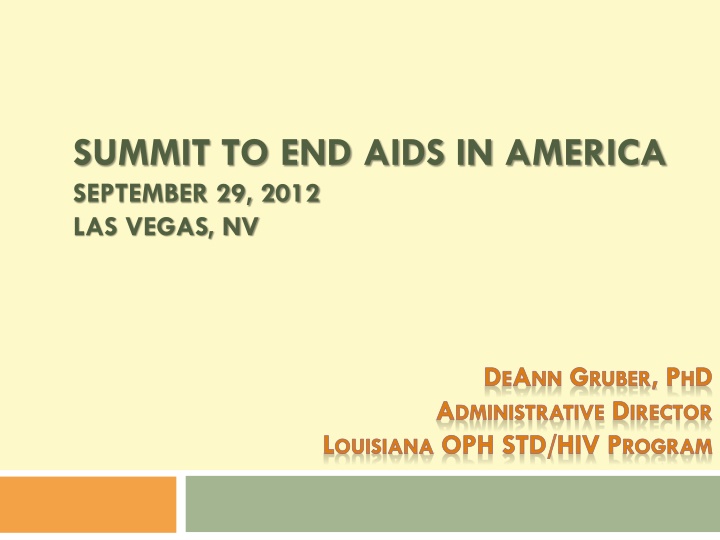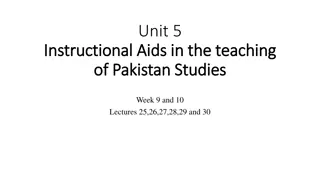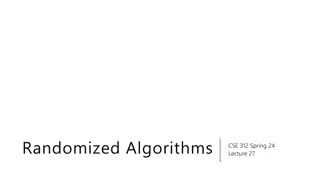
Summit to End AIDS in America - September 29, 2012 Las Vegas, NV
This description provides insights into a collaborative initiative aimed at ending AIDS in America, focusing on Louisiana's unique public health information exchange system. The system targets individuals with HIV, TB, and syphilis to ensure proper care and follow-up, utilizing innovative communication tools and surveillance data. Learn how the system functions and aids in re-engaging patients into care for HIV treatment.
Download Presentation

Please find below an Image/Link to download the presentation.
The content on the website is provided AS IS for your information and personal use only. It may not be sold, licensed, or shared on other websites without obtaining consent from the author. If you encounter any issues during the download, it is possible that the publisher has removed the file from their server.
You are allowed to download the files provided on this website for personal or commercial use, subject to the condition that they are used lawfully. All files are the property of their respective owners.
The content on the website is provided AS IS for your information and personal use only. It may not be sold, licensed, or shared on other websites without obtaining consent from the author.
E N D
Presentation Transcript
SUMMIT TO END AIDS IN AMERICA SEPTEMBER 29, 2012 LAS VEGAS, NV DEANN GRUBER, PHD ADMINISTRATIVE DIRECTOR LOUISIANA OPH STD/HIV PROGRAM
A Collaborative Initiative funded in part by: HRSA HIV/AIDS Bureau Office of Science and Policy Special Projects of National Significance
LOUISIANA PUBLIC HEALTH INFORMATION EXCHANGE (LAPHIE) A carefully designed two-way electronic information exchange Uses OPH surveillance data to generate point of care messages for providers in the LSU HCSD (public hospital) system in Louisiana Targets patients with HIV, TB, syphilis who have fallen out of care, or never received test results, as well as perinatally HIV-exposed infants needing follow-up
LSU HEALTH CARE SERVICE DIVISION HOSPITALS
LaPHIE - Surveillance Data Inputs HIV Surveillance Database Laboratory Database Target populations: Persons considered not in care (no record of CD4/VL in 12 months) Persons who have not received test results and may be unaware of HIV status HIV-exposed infants in need of follow-up LaPHIE Server LaPHIE Database Communication system: MIRTH open source (behind OPH firewall)
LaPHIE - Current Configuration Admission Information (ADT) Registration Disease Alert (PPR) Disease Alert Response (PRR) LaPHIE Server Interface Engine EMR Office of Public Health Firewall LSUHCSD Firewall
How LaPHIE Works Physician follows on- screen steps to re-engage patient into care and provide HIV treatment, as appropriate Real time communication with surveillance system alerts physician that patient needs attention for HIV/AIDS Patient comes to clinic, hospital, or ED for non- HIV service HIV clinic 7
HOW DID WE GET WHERE WE ARE TODAY? Assessed and modified technical infrastructure Designed messaging with iterative prototype process Established partnership, governance and agreements Conducted consumer research Participated in an ethics review by national experts in biomedical ethics, public health ethics and AIDS privacy Requested a legal review of legislation related to sharing of public health information Raised community awareness and readiness Prioritized open dialogue and established feedback mechanisms
CONSIDERATIONS USING SURVEILLANCE DATA Essential questions: We have the information and the technical ability to inform clinicians about patients in need of care BUT SHOULD WE? Would this be accepted by patients, providers, and the public? Do state laws and regulations allow the proposed information exchange? Is surveillance data reliable as a basis for clinical interventions? Can we adequately address security/privacy concerns? Considerations: Legitimate public health purposes Respect rights of individuals and communities Seek input from those to be impacted Minimize undue burden Privacy and security standards
PRELIMINARY RESULTS 2/1/09 THROUGH 1/31/12
MESSAGES THROUGH LAPHIE 825 alerts sent across system of which 719 (86%) were seen by a provider Among 547 unduplicated HIV patients with records alerted in system, 447 (82%) had any action taken Of all identified people 82% had at least one CD4 or viral load over follow up Among those followed at least 12 months (n=418) 84% had at least one CD4 or viral load over follow up Source: Activity
ACCEPTABILITY Substantial formative and evaluative work with consumers demonstrated acceptability N=24 qualitative interviews of LaPHIE identified patients Acceptable Positive experience of LaPHIE communication Perception that it is a good system System helped re-engage in care No negative calls to OPH hotline Provider ease of use, acceptable Source: Qualitative data
CONCLUSION Using LaPHIE, we were able to: Identify over 789 (thru 9/6/2012) HIV-infected individuals who had been out of care thereby reducing missed opportunities to intervene Offer clinical services to improve individual- and population-level health Determine that system is acceptable to both patients and providers through feedback processes Confirm that a well developed, stakeholder involved process promotes success in implementing novel approaches in addressing linkage and retention.
Acknowledgements Patients OPH HIV, STD and TB programs LSU/TU clinicians OPH nurses UH Infection Control OPH epidemiologists Delta Region AETC OPH Disease Intervention Specialists LSU SPH Medical Informatics & Telemedicine OPH Medical Directors HCSD CEO, CMO, CIO/CMIO DHH Legal Counsel LIS Core Group LPHI HCSD Programming Support
CONTACT INFORMATION Louisiana OPH STD/HIV Program LSU Health Care Services Division DeAnn Gruber, PhD Administrative Director deann.gruber@la.gov 504-568-7474 Jane Herwehe, MPH Project Coordinator jherwe@lsuhsc.edu 504-903-3089

![[PDF READ ONLINE] LAS VEGAS TRAVEL GUIDE 2023: DISCOVERING THE EXCITEMENT AND BE](/thumb/2060/pdf-read-online-las-vegas-travel-guide-2023-discovering-the-excitement-and-be.jpg)




















